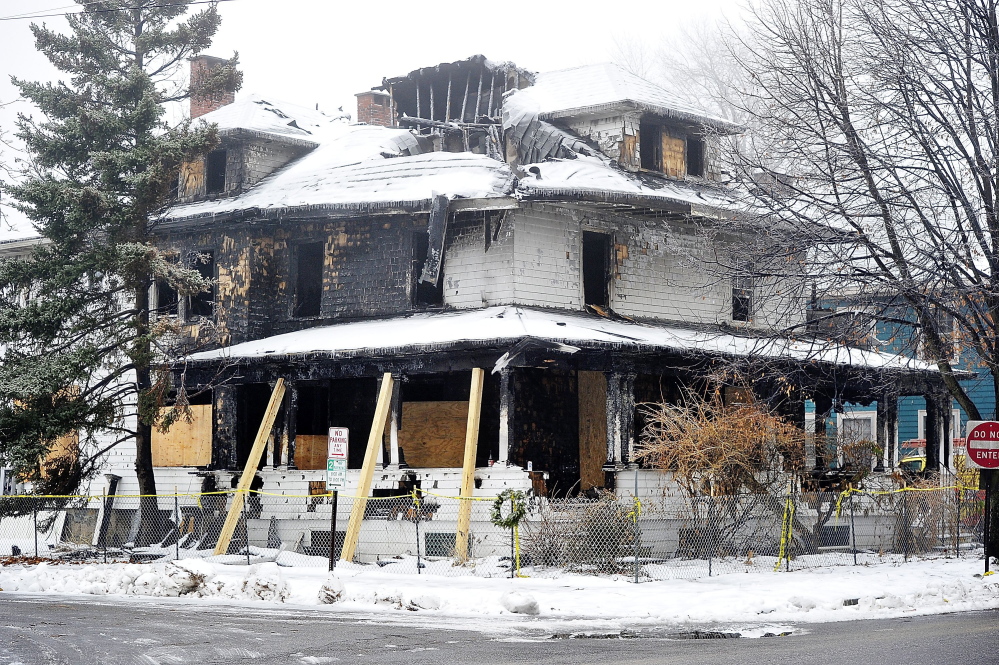A Portland task force is poised to recommend creating a new division with five employees who would focus on preventing the kind of apartment building fire that killed six young adults in November.
The 12-member task force plans to present its recommendations at a public meeting next week before formally presenting them to the City Council.
A new fire safety division is certain to be a top recommendation, and members hope it will enable the city to inspect more apartment buildings, follow up on violations more aggressively and better coordinate the city’s enforcement of safety standards. But it also is expected to be one of the more difficult recommendations to implement because the city is facing the potential loss of millions of dollars in state revenue, a possibility that already has led to a hiring freeze at City Hall.
The division would include new positions, but also would work with existing inspectors from the code enforcement and fire departments. The cost would be offset, at least partly, by new fees charged to owners of the city’s estimated 3,600 buildings with residential tenants. The amount of the fee hasn’t been decided, but members said Monday that they want it to be modest to encourage landlords to register and to avoid adding pressure on already-rising rents.
Julie Sullivan, the city’s public health director and the top administrator on the task force, presented a staffing plan at a meeting of the task force Monday.
The division would include a fire safety manager who reports directly to the city manager, three additional inspectors and one administrative assistant. The division also would employ a fire prevention education officer to be designated by the fire department.
Sullivan said Portland ideally would have a staff of 10 to take on citywide safety inspections, enforcement and education, but that such a recommendation would have no chance at a time when the city is facing potential cutbacks. The City Council ultimately will decide whether taxpayers can afford the new division. “It has to make it through the budget process,” Sullivan said.
The task force will meet Thursday to finalize its recommendations. It will present its report in a public meeting Feb. 3 and is scheduled to present the recommendation to city councilors Feb. 10.
The city created the task force after Maine’s deadliest fire in 40 years, the blaze on Nov. 1 that burned a two-unit apartment building on Noyes Street.
Smoke detectors throughout the building had been disabled and the occupants were asleep when discarded “smoking materials” ignited the front porch. With one escape route blocked by the fire and another blocked by debris inside the house, a few occupants escaped by jumping out second-floor windows. Five occupants died inside the building from smoke inhalation. A sixth person was severely burned and died four days later.
The building was not subject to routine safety inspections that might have revealed the lack of smoke detectors and the blocked exit because only buildings with at least three units are subject to periodic, preventive inspections. Those larger apartment buildings are supposed to be inspected annually, but the city does not have the resources to keep up with those, either, officials have said.
Task force members remained divided Monday about whether the new inspections division will have enough staff to expand the inspection program to include the large number of smaller buildings with two rental units.
Crandall Toothaker, a landlord and member of the task force, said the group was created because of the Noyes Street fire and needs to improve the safety of two-unit buildings like the one that burned. “To not do something with two-family buildings would turn a blind eye to what’s out there,” he said.
INSPECTION REPORTS DATABASE
In addition to the new inspectors, the task force is poised to recommend that city safety inspection reports be posted in a publicly accessible database so tenants and others can find out if there are violations in their buildings.
The task force also may call for the city to identify which landlords are operating unlicensed rooming houses, which means they rent out individual bedrooms rather than apartments.
Unlike apartments shared by families or roommates, rooming houses typically have more residents who are transient and unrelated. The city requires rooming houses to be licensed and have more sophisticated fire alarms, among other things, because of the potential higher risk.
Investigators found that the Noyes Street apartment building was being operated as an unlicensed rooming house, one of the factors that the District Attorney’s Office is reviewing as it considers criminal charges against the landlord, Gregory Nisbet.
At least four lawsuits have been filed against the building’s owner on behalf of the victims’ families.
Portland officials also are threatening legal action against Nisbet because of safety violations found during an inspection of a nearby building he owns on Dartmouth Street. Officials say that building also was being operated as an unlicensed rooming house, among other things.
Send questions/comments to the editors.



Success. Please wait for the page to reload. If the page does not reload within 5 seconds, please refresh the page.
Enter your email and password to access comments.
Hi, to comment on stories you must . This profile is in addition to your subscription and website login.
Already have a commenting profile? .
Invalid username/password.
Please check your email to confirm and complete your registration.
Only subscribers are eligible to post comments. Please subscribe or login first for digital access. Here’s why.
Use the form below to reset your password. When you've submitted your account email, we will send an email with a reset code.